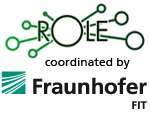Invited Papers
Invited papers are published in the proceedings and will be presented in plenary sessions.
Personal Services: debating the wisdom of personalisation
Helen Ashman, UniSA, Australia
Location: Generali Hall – August 20, 17.45 - 18.15
On Social e-Learning
Won Kim, Sungkyunkwan University, Korea
Location: Generali Hall – August 20, 9.45 - 10.15
Web-based Learning – Yes we can!
Ulrik Schroeder, RWTH Aachen, Germany
Location: Generali Hall – August 19, 17.45 - 18.15
Personal Services: debating the wisdom of personalisation
Helen Ashman, UniSA, Australia
Abstract: Personalisation has been seen as the answer to the vast quantity of information now available digitally. Information is tailored to meet each user's apparent needs, whether making use of Web-based learning materials, purchasing from online sites, accessing entertainment products or any other potentially-personalisable facility. Yet before rushing headlong into personalising everything, including online learning systems, we need to consider the threats posed by the capture of so much data about individuals, the implications of personalised information delivery, and whether the benefits of personalisation justify the costs. In this paper, we look at both the issues and benefits of personalisation, and consider how to steer our way to a safe and valuable use of personalisation.
 Helen Ashman has worked in hypertext and Web research since 1992, starting
with the Australian Defence Science and Technology Organisation, then
spending a year in Southampton with Wendy Hall's group before doing a PhD
with RMIT on dynamic hypertext. She then moved to the University of
Nottingham, where she set up the Web Technologies Group and became
Editor-in-Chief of the new ACM Transactions on the Web. She recently moved
back to Australia and now leads the WebTech and Security Lab at the
University of South Australia. She has recently guest-edited special issues
on Distance Learning and Emerging Internet Technologies and Applications for
e-Learning for IEEE Internet Computing.
Helen Ashman has worked in hypertext and Web research since 1992, starting
with the Australian Defence Science and Technology Organisation, then
spending a year in Southampton with Wendy Hall's group before doing a PhD
with RMIT on dynamic hypertext. She then moved to the University of
Nottingham, where she set up the Web Technologies Group and became
Editor-in-Chief of the new ACM Transactions on the Web. She recently moved
back to Australia and now leads the WebTech and Security Lab at the
University of South Australia. She has recently guest-edited special issues
on Distance Learning and Emerging Internet Technologies and Applications for
e-Learning for IEEE Internet Computing.
Personalisation has always been one of her interests, whether in the
military context or educational, and at the same time so has security and
privacy. While she believes in the promise of personalisation, she feels it
needs to be experimentally validated, especially in the e-learning context,
so that it can be proved to live up to its promise.
On Social e-Learning
Won Kim, Sungkyunkwan University, Korea
Abstract: Social Web sites include social networking sites and social media sites. They make it possible for people to share user-created contents online and to interact and stay connected with their online people networks. The social features of social Web sites, appropriately adapted, can help turn e-learning into social e-learning and make e-learning significantly more effective. In this paper, we develop requirements for social e-learning systems. They include incorporating the many of the social features of social Web sites, accounting for all key stakeholders and learning subjects, and curbing various types of misuses by people. We also examine the capabilities of representative social e-learning Web sites that are available today.
 Won Kim is currently a professor and university fellow with the School of Information and Communication Engineering in Sungkyunkwan University (SKKU) in Suwon, S. Korea. He is also a senior advisor with Xener Systems, Inc. in Seoul, S. Korea. He received a Ph.D. in computer science from the University of Illinois at Urbana-Champaign. He received a B.S. and M.S. from the Massachusetts Institute of Technology. He is best-known as one of the pioneers of object-oriented and object-relational database technologies. He led the ORION object-oriented database systems project at MCC, Austin, Texas in the late 1980s. He founded UniSQL and created the world’s first commercial object-relational database system in the early 1990s. On the side, he founded and served as Chair of ACM’s SIGKDD data mining society, and as Editor-in-Chief of ACM’s Transactions on Internet Technology journal. He also served as Chair of ACM’s SIGMOD data management society, and as Editor-in-Chief of ACM ‘s Transactions on Database Systems. He is an ACM Fellow, and received such awards as ACM’s Distinguished Services Award, ACM SIGMOD Test of Time Research Award, VLDB Ten Year Best Paper Award, etc. His current research umbrella is social computing architecture, which includes such subjects as social Web sites, Internet search engine architecture, Web mining, cloud computing, networked embedded systems, and HCI usability.
Won Kim is currently a professor and university fellow with the School of Information and Communication Engineering in Sungkyunkwan University (SKKU) in Suwon, S. Korea. He is also a senior advisor with Xener Systems, Inc. in Seoul, S. Korea. He received a Ph.D. in computer science from the University of Illinois at Urbana-Champaign. He received a B.S. and M.S. from the Massachusetts Institute of Technology. He is best-known as one of the pioneers of object-oriented and object-relational database technologies. He led the ORION object-oriented database systems project at MCC, Austin, Texas in the late 1980s. He founded UniSQL and created the world’s first commercial object-relational database system in the early 1990s. On the side, he founded and served as Chair of ACM’s SIGKDD data mining society, and as Editor-in-Chief of ACM’s Transactions on Internet Technology journal. He also served as Chair of ACM’s SIGMOD data management society, and as Editor-in-Chief of ACM ‘s Transactions on Database Systems. He is an ACM Fellow, and received such awards as ACM’s Distinguished Services Award, ACM SIGMOD Test of Time Research Award, VLDB Ten Year Best Paper Award, etc. His current research umbrella is social computing architecture, which includes such subjects as social Web sites, Internet search engine architecture, Web mining, cloud computing, networked embedded systems, and HCI usability.
Web-based Learning – Yes we can!
Ulrik Schroeder, RWTH Aachen, Germany
Abstract: Web-based Learning has become a matter of fact at universities. We are now at the edge of new developments with Web 2.0 applications and social software is radically changing the way of how we communicate and share in social networks. Can we expect an analogous revolution for university education 2.0? I will give some arguments that I rather expect an incremental evolution than a radical change. First, I take a look at current eLearning implementations and organizational frameworks and give an example from RWTH Aachen University. Against the background of cognitive theories the utilization of Web 2.0 applications are promising to strengthen 21st century learning. But methods and tools must be adapted to the context of institutional learning as well as the formal regulations must be adjusted vice versa.
 Ulrik Schroeder has been professor of Computer Science at RWTH Aachen
University since 2002. He heads the research group Computer-supported
Learning and Didactics in Computer Science (http://eLearn.rwth-aachen.de/)
as well as the CiL (Center for integrative teaching and learning Of RWTH
Aachen University: http://www.cil.rwth-aachen.de/). His research includes
assessment and intelligent feed back with a focus on learning processes, Web
2.0 applications and social software in education, mobile internet and
learning, gender mainstreaming in education, Computer Science didactics.
Prof. Schroeder teaches courses on eLearning, Web Technologies,
Instructional Design and Computer Science Education.
Ulrik Schroeder has been professor of Computer Science at RWTH Aachen
University since 2002. He heads the research group Computer-supported
Learning and Didactics in Computer Science (http://eLearn.rwth-aachen.de/)
as well as the CiL (Center for integrative teaching and learning Of RWTH
Aachen University: http://www.cil.rwth-aachen.de/). His research includes
assessment and intelligent feed back with a focus on learning processes, Web
2.0 applications and social software in education, mobile internet and
learning, gender mainstreaming in education, Computer Science didactics.
Prof. Schroeder teaches courses on eLearning, Web Technologies,
Instructional Design and Computer Science Education.







